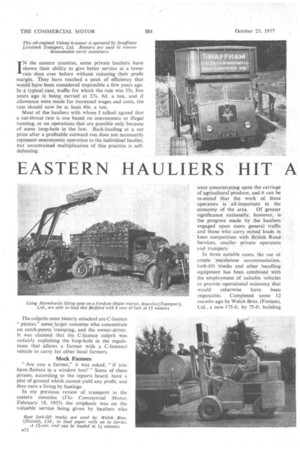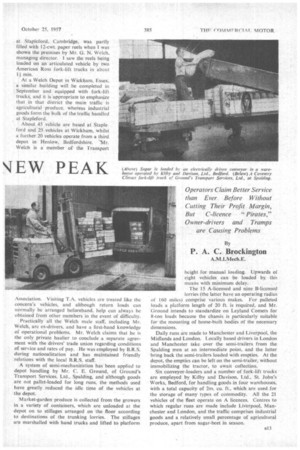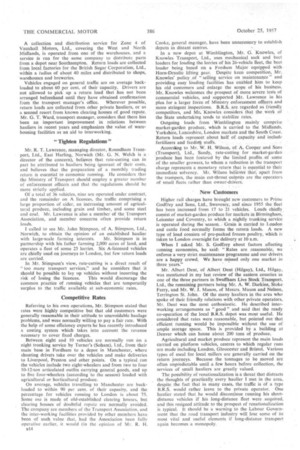EASTERN HAULIERS HIT A \TEW PEAK
Page 46

Page 47

Page 48

If you've noticed an error in this article please click here to report it so we can fix it.
Operators Claim Better Service than Ever. Before Without Cutting Their Profit Margin, But C-licence "Pirates," Owner-drivers and Tramps
are Causing Problems
By
P. A. C. Orockington
A.M.I.Mech.E.
IN the eastern counties, some private hauliers have shown their ability to give better service at a lower rate than ever before without reducing their profit margin. They have reached a peak of efficiency that would have been considered impossible a few years ago. In a typical case, traffic for which the rate was 35s, five years ago is being carried at 27s. 6d. a ton, and if allowance were made for increased wages and costs, the rate should now be at least 40s. a ton.
Most of the hauliers with whom I talked agreed that a cut-throat rate is one based on uneconomic or illegal running, or on operations that are possible only because of some loop-hole in the law. Back-loading at a cut price after a profitable outward run does not necessarily represent uneconomic operation to the individual haulier, but unrestrained multiplication of this practice is selfdefeating.
The culprits most bitterly attacked are C-licence "Pirates," some larger concerns who concentrate on catch-penny tramping, and the owner-driver. It was claimed that the C-licence culprit was unfairly exploiting the loop-hole in the regulations that allows a farmer with a C-licensed vehicle to carry for other local farmers.
Mack Farmers
"Are you a farmer," it was asked. " if you have flowers in a window box?" Some of these pirates, according to the reports heard, have a plot of ground which cannot yield any profit, and they earn a living by hattlage.
In my previous review of transport in the eastern counties (The Commercial Motor, February 18, 1955) the emphasis was on the valuable service being given by hauliers who Ross fork-lift trucks are used by Welch Bros. (Fox/on), Ltd., to load paper reels on to lorries. A 12-cwt. reel can be loaded in 4 minutes. el 2
were concentrating upon the carriage of agricultural produce, and it can be re-stated that the work of these operators is all-important in the economy of the area. Of greater significance nationally, however, is the progress made by the hauliers engaged upon more general traffic and those who carry mixed loads in keen competition with British Road Services, smaller private operators and tramperS.
In three notable cases, the use of ample warehouse accommodation, fork-lift trucks and other handling equipment has been combined with the employment of suitable vehicles to provide operational economy that would otherwise have been impossible. Completed some 12 months ago by Welch Bros. (Foxtpn), Ltd., a new-175-ft by 75-ft. building at Stapletord, Cambridge, was partly filled with I2-cwt. paper reels when I. was shown the premises by Mr. G. N. Welch, managing director. I saw the reels being loaded on an articulated vehicle by two American Ross fork-lift trucks in about 1+ min.
At a Welch Depot in Wickham, Essex, a, similar building will be completed in September and equipped with fork-lift trucks, and it is appropriate to emphasize that in that district the main traffic is agricultural produce, whereas industrial goods form the bulk of the traffic handled at Stapleford.
About 45 vehicle are based at Stapleford and 25 vehicles at Wickham, whilst a further 20 vehicles operate from a third depot in Henlow, Bedfordshire. 'Mr. Welch is a member of the Transport Association. Visiting T.A. vehicles are treated like the concern's vehicles, and although return toads can normally be arranged beforehand, help can always be obtained from other members in the event of difficulty.
Practically all the Welch male staff, including Mr. Welch, are ex-drivers, and have a first-hand knowledge of operational problems. Mr. Welch claims that he is the only private haulier to conclude a separate agreement with the drivers' trade union regarding conditions of service and rates of pay. He was employed by B.R.S. during nationalization and has maintained friendly relations with the local 13.R.S. staff.
A system of semi-mechanization has been applied to depot handling by Mr. C. E. Ground, of Ground's Transport Services, Ltd., Spalding, and although goods are not pallet-loaded for long runs, the methods used have greatly reduced the idle time of the vehicles at the depot.
Market-garden produce is collected from the growers in a variety of containers, which are unloaded at the depot on to stillages arranged on the floor according to destinations of the trunking lorries. The stillages are marshalled with hand trucks and lifted to platform height for manual loading. Upwards of eight vehicles can be loaded by, this means with minimum delay.
The 15 A-licensed and nine B-licensed lorries (the latter have an operating radius of 100 miles) comprise various makes. For palleted loads a platform length of 20 ft. is required, and Mr. Ground intends to standardize on Leyland Comets for 8-ton loads because the chassis is particularly suitable for the mounting of home-built bodies of the necessary dimensions.
Daily runs are made to Manchester and Liverpool, the Midlands and London. Locally based drivers in London and Manchester take over the semi-trailers from the Spalding men at an intermediate point, and the latter bring back the semi-trailers loaded with empties. At the depot, the empties can be left on the semi-trailer, without immobilizing the tractor, to await collection.
Six conveyor-loaders and a number of fork-lift trucks are employed by Kilby and Davison, Ltd., St. John's Works, Bedford, for handling goods in four warehouses, With a total capacity of 2m. cu. ft., which are used for the storage of many types of commodity. All the 21 vehicles of the fleet operate on A licences. Centres to which regular runs are made include Liverpool, Manchester and London, and the traffic comprises industrial goods and a relatively small percentage of agricultural produce, apart from sugar-beet in season. A collection and distribution service for Zone 4 of Vauxhall Motors, Ltd., covering the West and North Midlands, is operated from one of the warehouses, and a service is run for the same company to distribute parts from a depot near Southampton. Return loads are collected from local factories for the British Sugar Corporation, Ltd., within a radius of about 40 miles and distributed to shops, warehouses and breweries.
Vehicles engaged on general traffic are on average backloaded to about 60 per cent. of their capacity. Drivers are not allowed to pick up a return load that has not been arranged beforehand until they have obtained confirmation from the transport manager's office. Wherever possible, return loads are collected from other private hauliers, or as a second resort from known clearing houses of good repute. Mr. G. T. Ward, transport manager, considers that there has been an important improvement in relations between hauliers in recent years and emphasizes the value of warehousing facilities as an aid to interworking.
"Tighten Regulations"
Mr. R. T. Lawrence, managing director, Roundham Transport, Ltd., East Marling, Norwich (Mr. 0. N. Welch is a director of the concern), believes that rate-cutting can in part be attributed to hauliers being ignorant of their costs, and believes that the preparation of a monthly trading return is essential to economic running. He considers that the Ministry of Transport should employ a greater number of enforcement officers and that the regulations should be more strictly applied.
Of a total of 36 vehicles, nine are operated under contract, and the remainder on A licences, the traffic comprising a large proportion of cider, an increasing amount of agricultural produce, including grain and timber, and some steel and coal. Mr. Lawrence is also a member of the Transport Association, and member concerns often provide return loads.
I called to see Mr. John Stimpson, of A. Stimpson, Ltd., Norwich, to obtain the opinion of an established haulier with large-scale farming interests. Mr. Stimpson is in partnership with his father farming 2,000 acres of land, and operates a fleet of some 25 lorries. Six A-licensed vehicles are chiefly used on journeys to London, but few return loads are carried.
In Mr. Stimpson's view, rate-cutting is a direct result of "too many transport services," and he considers that it should be possible to lay up vehicles without incurring the risk of losing the licences. This would discourage the common practice of running vehicles that are temporarily surplus to the traffic available at sub-economic rates.
Competitive Rates
Referring to his own operations, Mr. Stimpson stated that rates were highly competitive but that old customers were generally reasonable in their attitude to unavoidable haulage problems, and were normally willing to pay a fair rate. With the help of some efficiency experts he has recently introduced a costing system which takes into account the revenue necessary to cover fixed charges.
Between eight and 10 vehicles are normally run on a night trunking service by Turner's (Soham), Ltd., from their main base in Fordham to a depot in Manchester, where shunting drivers take over the vehicles and make deliveries to Liverpool, Preston and other points, On a typical run the vehicles include two eight-wheelers and from two to four 10-12-ton articulated outfits carrying general goods, and up to five four-wheelers (according to the season) loaded with agricultural or horticultural produce.
On average, vehicles travelling to Manchester are backloaded to within 90 per cent, of their capacity, and the percentage for vehicles running to London is about 75. Some use is made of old-established clearing houses, but clearing houses of doubtful repute are normally avoided. The company are members of the Transport Association, and the inter-working facilities provided by other members have been of such value that, had the Association been fully operative earlier, it would (in the opinion of Mr. R. H.
B14 Cooke, general manager, have been unnecessary to establish depots in distant centres.
In a new depot at Wimblington, Mr. G. Knowles, of Knowles Transport, Ltd., uses mechanical sack and beet loaders for loading the lorries of his 26-vehicle fleet, the beet loader being based on a Fordson Major equipped with Horn-Draulic lifting gear. Despite keen competition, Mr. Knowles' policy of " selling service on maintenance" and providing easy loading facilities has enabled him to keep his old customers and enlarge the scope of his business. Mr. Knowles welcomes the prospect of more severe tests of commercial vehicles, and supported Mr. Lawrence in his plea for a larger force of Ministry enforcement officers and more stringent inspections. B.R.S. are regarded as friendly competitors, and Mr. Knowles considers that the work of the State undertaking tends to stabilize rates.
Outgoing loads from Wimblington mainly comprise market-garden produce, which is carried to the Midlands, Yorkshire, Lancashire, London markets and the South Coast. Return loads represent about half of capacity and include fertilizers and feedint stuffs. • According to Mr. W. H. Wilson, of A. Cooper and Sons (Transport), Ltd., Sandy, rate-cutting for market-garden produce has been fostered by the limited profits of some of the smaller growers, to whom a reduction in the transport charge represents a monetary return that is essential to their immediate solvency. Mr. Wilson believei that apart from the trarnpers, the main cut-throat culprits are the operators of small fleets rather than owner-drivers.
New Customers
Higher rail charges have brought new customers to Prime Godfrey and Sons, Ltd., Swavesey, and since 1955 the fleet has been increased from 17 to 21 vehicles. Loads chiefly consist of market-garden produce for markets in Birmingham, Leicester and Coventry, to which a nightly trunking service is operated during the season. Grain is carried to London and cattle food normally forms the return loads, A new type of load consists of pre-packed frozen poultry, which is taken to London overnight for delivery at 10 a.m.
When I asked Mr. S. Godfrey about factors affecting 'tinning economies, he said: "Rates are reasonable, we enforce a very strict maintenance programme and our drivers are a happy crowd. We have missed only one market in three years."
Mr. Albert Dent, of Albert Dent (1-Ifigay), Ltd., Hilgay, was mentioned in my last review of the eastern counties as one of the three partners in Swaffham Live Stock Transport. Ltd., the remaining partners being Mr. A. W. Darkins, Stoke Ferry, and Mr. W. J. Mason, of Messrs. Mason and Nelson, Terrington St. John. Of the many hauliers in the area who spoke of their friendly relations with other private operators, Mr. Dent was the most enthusiastic. He described interworking arrangements as " good " and said that the ready co-operation of the local B.R.S. depot was most useful. He considered that rates were reasonable, but pointed out that efficient running would be impossible without the use of ample storage space. This is provided by a building at Denver which can house about 200 tons of produce.
Agricultural and market produce represent the main loads carried on platform vehicles, centres to which regular runs are made including London, Gloucester and Bristol. Various types of meal for local millers are generally carried on the return journeys. Because the tonnages to be moved are often unpredictable until a few hours before collection, the services of small hauliers are greatly valued.
The possibility of renationalization is a threat that distracts the thoughts of practically every haulier I met in the area, despite the fact that in many cases, the traffic is of a type B.R.S. would rather leave to the private operator. One haulier stated that he would discontinue running his shortdistance vehicles if his long-distance fleet were acquired, and this resigned attitude to the prospect of renationalization is typical. It should be a warning to the Labour Government that the road transport industry will lose some of its most vital and useful elements if long-distance transport again becomes a monopoly.




































































































